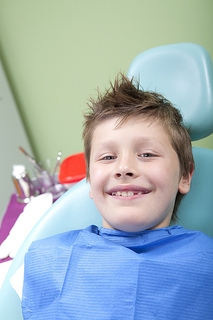How do I handle my child’s dental emergency?
October 14th, 2014

With children undergoing developmental dental changes and engaging in rough-and-tumble activities, dental emergencies can sometimes arise. If your child knocks out a tooth or experiences any type of oral discomfort, call Northwest Smile Design right away so we can provide you with a quick assessment and pain-free treatment.
Before an emergency occurs, it’s a good idea to stay informed about the problems your child may encounter. Here are a few things you should keep in mind about teething pain, loose baby teeth, and other common dental issues.
Teething Pain
Typically occurring in babies that are between four months and two and a half years old, teething may cause excessive drooling, tender gums, and some irritability. Giving your baby a cold teething ring or gently rubbing her gums with wet gauze or your finger may also make her feel better.
Loose Baby Tooth
It is normal for a child’s first set of teeth to become loose and fall out. On the other hand, if your child’s baby tooth is knocked loose, schedule an appointment with our office so we can assess whether any damage has been done.
Issues with Permanent Teeth
Sometimes a child’s permanent teeth will grow in before the baby teeth have fallen out. Even if this condition isn’t causing any discomfort, you should schedule an appointment with our office so we can determine whether your child’s permanent teeth are growing in correctly.
Bleeding Gums
Bleeding gums can result from a number of factors, including periodontal disease, rough brushing, or an injury to the gum tissue. If your child’s gums are bleeding heavily, call our office right away so we can address the situation. If you have time before your appointment, wash your child’s mouth with salted water and gently put pressure on the affected area.
Regardless of the type of dental issue your child has, you can always consult Dr. Kelly Peterson for further guidance. We make sure our emergency services are available 24 hours a day and seven days a week, so you have ready access to convenient and professional dental care that will have your child feeling better in no time.









 Website Powered by Sesame 24-7™
Website Powered by Sesame 24-7™